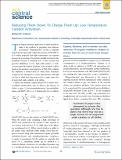Reducing Them Down To Charge Them Up: Low Temperature Catalyst Activation
Author(s)
Schrock, Richard Royce
Downloadacscentsci.6b00223.pdf (215.9Kb)
PUBLISHER_POLICY
Publisher Policy
Article is made available in accordance with the publisher's policy and may be subject to US copyright law. Please refer to the publisher's site for terms of use.
Terms of use
Metadata
Show full item recordAbstract
The largest industrial application of olefin metathesis today is the synthesis of propylene from ethylene and butenes(1) employing WO₃ on SiO₂, a relatively long-lived and regenerable catalyst that operates at 350–400 °C. It is widely proposed that high temperatures are required because the percentage of metal sites actually involved in the metathesis reaction is extremely low, or the reaction that generates alkylidenes is not a high yield reaction, or both. A recent paper by Copéret, Mashima, and co-workers(2) tackles head-on the question concerning how in WO₃/SiO₂ catalysts the alkylidene is formed from an olefin alone. Hundreds of papers have attempted to answer this question, although one has to admit that there may not be a single answer for all supported oxide catalysts or all olefins.
Date issued
2016-08Department
Massachusetts Institute of Technology. Department of ChemistryJournal
ACS Central Science
Publisher
American Chemical Society (ACS)
Citation
Schrock, Richard R. “Reducing Them Down To Charge Them Up: Low Temperature Catalyst Activation.” ACS Central Science 2, 8 (August 2016): 495–496 © 2016 American Chemical Society
Version: Final published version
ISSN
2374-7943
2374-7951